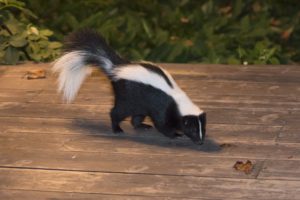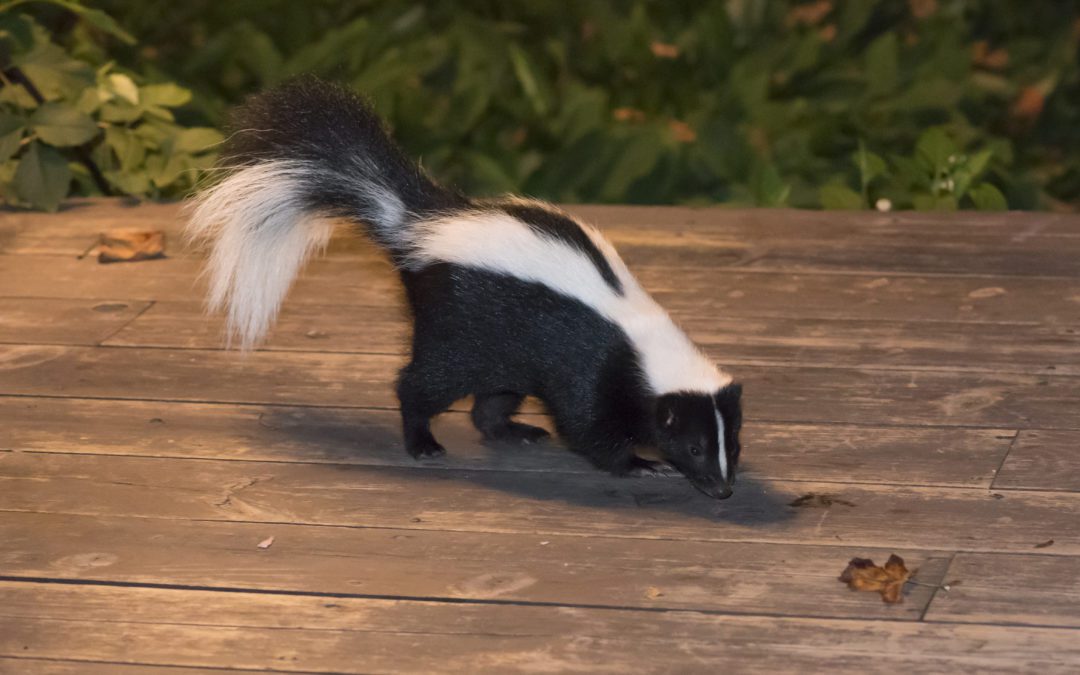Skunks are most well-known for the distinctive, malodorous substance they project from the glands beneath their tails when defending themselves from potential predators. When a skunk feels as though it may be in danger, it will stomp its feet, lift its tail, and aim its spray at whatever it views as a threat. This oily, yellow substance is incredibly pungent, and a skunk is able to aim its trajectory for up to 20 feet. Though it is in no way toxic or harmful, being the victim of a skunk’s spray, whether it’s targeting you specifically or simply permeating your home or business with its odor, can be a very stressful experience. There are, however, measures that can be taken to remove skunk smell and prevent the need for skunk removal in the future.
Eliminating Skunk Odor

If your home or business is being plagued by a persistent skunk odor, the most effective means for removing the smell is ventilation. Open doors and windows to allow airflow through the area, and the smell should dissipate fairly quickly.
If a skunk’s spray has gotten onto clothing, outdoor furniture, canopies, or awnings, eliminating the scent may prove more challenging. First, wash any effected cloth-made objects in the washing machine, as you would normally. It may take several rounds of washing before the smell disappears entirely. Because this glad secretion is oily, it will cling to porous material, so it is best to use heavy-duty detergents designed for grease removal. If the smell remains after this, it may be necessary to seek the services of a professional cleaner.
Skunk Removal and Preventative Measures
The most effective way to address a skunk problem is prevention. There are several measures that can be taken to lessen the appeal of your property as a denning site.
Skunks are burrowing animals and like to dig their dens in dark, confined spaces under structures. To keep skunks from building their home beneath these areas, it is best to barricade decks, patios, sheds, and porches with expanded-steel screen. The skunk removal specialists at ABC Wildlife know the best methods for installing the screen so it is effective against burrowing. Skunks may also seek shelter beneath debris left in yards, so removing objects like woodpiles from your land will help in reducing den site possibilities.
Omnivorous scavengers, skunks will consume a variety of different foods, though they are very fond of foraging for grubs. Treating your yard for grubs will eliminate this food source, making your property a less attractive nesting area to skunks. It may save your lawn from being dug up as well. Skunks also enjoy birdseed, and have been known to dwell in areas where they can take advantage spillover from birdfeeders. Moving your feeders to an area that is inaccessible to foragers or removing them altogether can assist in preventing a skunk presence.
Should you encounter a skunk yourself, do not approach it to avoid being sprayed or bitten. Skunks are nonaggressive, but they are known carriers of rabies and may bite if provoked. Since skunks are nocturnal and more likely to be active at night, do not allow your dog outside after dark for these same reasons.
When facing a skunk problem, the best plan of action is to contact a skunk removal expert like ABC Wildlife. We have specialists trained and experienced in identifying skunk den sites, developing a site-specific plan to eliminate skunk presence, and making well-informed suggestions to avoid future animal breach. Trust the licensed animal control professionals at ABC Wildlife to help you deal with your skunk problem in the most effective manner possible.
Sharing is caring! If you’ve learned something from what you’ve read, please click one of the icons below to share this post on social media.



